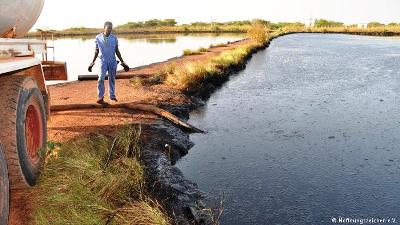South Sudan appeals to UN body over oil-polluted water
December 6, 2017 (JUBA) – South Sudan government has, through its ministry for environment, urged the United Nations Environmental Assembly to help end oil pollution of its water resources.

“South Sudan is facing an oil-caused environmental disaster. Help us clean it up,” reads the environmental ministry’s appeal to the UN environment body.
For the last nine years, for instance, Sign of Hope and scientists with which it works have persistently alerted the world to this enormous and growing crime against human rights and the environment.
“The government of South Sudan and its corporate allies has repeatedly denied the existence of this ravaging of people’s lives and livelihoods. That is why we especially welcome the government’s admission of there being a problem,” said Klaus Stieglitz, deputy chairperson for the German based non-governmental organisation.
“We now look forward to the great clean-up. The first step: a full-scale investigation of South Sudan’s oil fields’ environments and environs,” he added.
Last year, Sign of Hope warned that dangerous heavy metals used in oil production in South Sudan have leaked into drinking water sources used by 180,000 people with life-threatening health risks.
“Toxicological tests carried out on hair samples from 96 volunteers living around the Thar Jath oil processing plant in South Sudan’s northern Unity region revealed they were “highly intoxicated with pollutants such as lead and barium,” said Stieglitz.
“It is time to put an end to this human-made crisis,” stressed Stieglitz.
South Sudan got the lion’s share of the oil when it split from Sudan in 2011, but it’s only export route is through Sudan, giving Khartoum leverage and leading to ongoing pricing disputes.
Since independence, however, South Sudan has relied on oil for all income, a situation that has significantly compounded ongoing political and economic instability due to the fall in crude oil prices.
South Sudanese officials say production, in the past, reached as high as 350,000 bpd but fell after a dispute with Sudan over fees for pumping South Sudan’s crude through Sudan’s export pipeline, which prompted South Sudan to halt production in 2012.
(ST)
